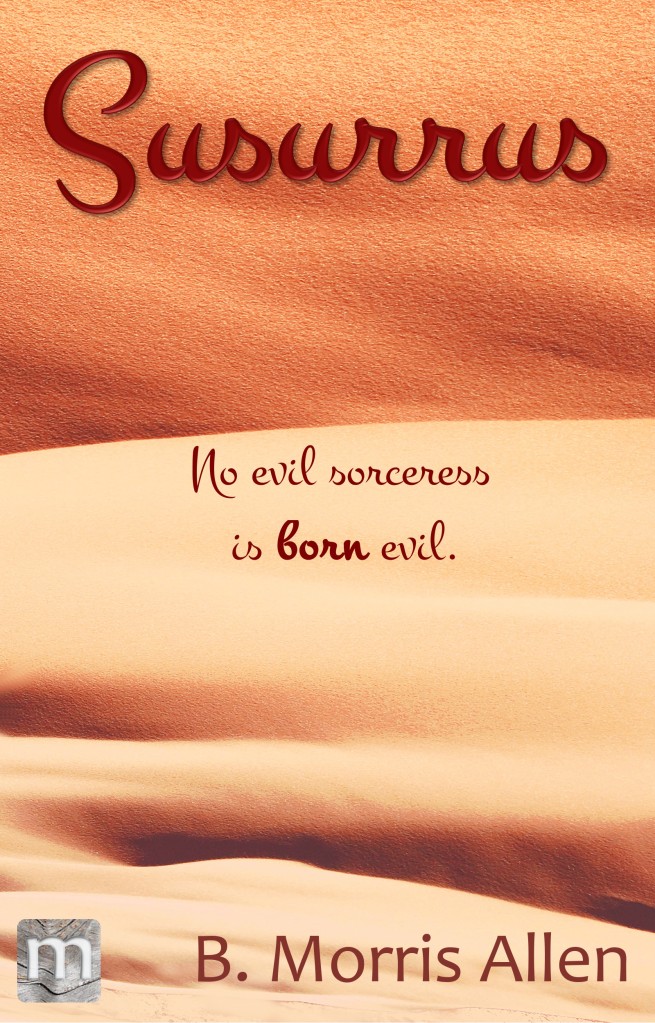
SPFBO Status: Cut
Medium: Kindle
Overview (No Spoilers):
Susurrus by B. Morris Allen asks readers to consider the question: how exactly does an evil sorceress become evil? At the outset of the story, the main character, Iskra, is wandering in the desert, delirious and hopelessly dreaming of water and the magic that has seemingly deserted her. Her desperate thoughts offer a glimpse of the greatness she once possessed, leaving the reader to wonder how she came to be in her current predicament. The answer lies in the rest of the story, tracing Iskra’s journey from starving mountain girl to powerful sorceress, including the numerous tragedies she experiences along the way.
One of the aspects I really liked about this novel is how Allen constantly changes up the setting, and the reader joins Iskra as she discovers new lands and different types of magic. I thoroughly enjoyed the chapters about a sea-faring nation, and in particular, the confident and good-natured captain who takes Iskra under her wing. The unnamed captain felt more fleshed out and interesting than many of the other secondary characters that populate Susurrus. I also appreciated the numerous powerful female roles in Susurrus; the book is populated by women in charge, both good and evil in character, rather than featuring the one token “strong woman” found in many novels.
However, the book struggles with inconsistent character development and spotty relationship building. There’s a lack of continuity between the meek orphan at the beginning of the novel and the commanding young woman she becomes after the narration skips ahead several years. Additionally, some of the relationships felt shallow and unrealistic, which made me question the authenticity of character motivations and decisions. Because of this, I found it hard to connect with Iskra or understand her choices. Finally, there were several plotlines that went nowhere or were too conveniently resolved.
The biggest problem I have with Susurrus is the blasé attitude of Iskra towards some of the traumatic events in the novel. In particular, the indifference with which the book treats sexual assault was repugnant to me. The main character endures at least four occurrences of unwanted sexual contact or rape with no more than vague expressions of discomfort or annoyance; the book exhibits almost no understanding of the psychological and emotional trauma that sexual violence leaves on a victim. In fact, in two instances, the assailant is later described sympathetically, as though they are suddenly good guys or, in one case, a possible love interest of Iskra’s. Needless to say, I have zero tolerance for this particular issue in a book.
Additional Insight (Spoilers Abound):
- The relationship with Neris feels manufactured for the storyline; Iskra really spends very little of the book developing a relationship that is so central to the story. Additionally, he basically sells her into reproductive slavery, but she doesn’t blame him at all for this.
- The magical rules in this world are a bit simplistic. I also took issue with the fact that Iskra is the only one who has ever been able to figure out how to learn the magic of multiple places; this seems like a contrived part of the plot.
- What happened to Heroton and the slavery tensions between them and the mountain people? This is given a longer and more in-depth set-up than many other conflicts in the novel, and yet it feels like its resolution is completely glossed over.
- Did Iskra ever make it back to Alusia to see her old mistress, Kiya?
Vocabulary Builder:
Suppurating: to form or discharge pus
Prestidigitation: Legerdemain- SLEIGHT OF HAND
Expiation: the act of extinguishing the guilt incurred by something
Inchoate: being only partly in existence or operation
Vitiating: to make faulty or defective
